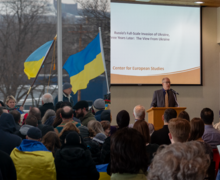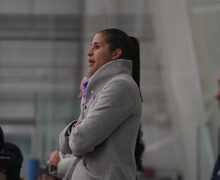Former Amazon chief scientist discusses data in 1st University Lecture of semester
Logan Reidsma | Asst. Photo Editor
Andreas Weigend, former chief scientist at Amazon and data expert, delivered his lecture titled, “We Are Our Data: Harnessing the Power of Social Data” Tuesday night in Hendricks Chapel to a crowd of about 130 members of the SU community.
Andreas Weigend got a “real job” with Amazon. The job gave Weigend the opportunity to work with all sorts of data.
“We could try everything,” he said.
Weigend, former chief scientist at Amazon and data expert, delivered his lecture titled, “We Are Our Data: Harnessing the Power of Social Data” Tuesday night in Hendricks Chapel to a crowd of about 130 members of the SU community. Weigend’s was the first University Lecture of the spring semester, and he addressed the way data affects people’s daily lives.
The lecture began with a note from Weigend’s background in music. He said he had never spoken in a church before, but had performed the cello.
“I actually wanted to start off in audio engineering,” he said. “But there was no place to study.” As a result, Weigend pursued a doctorate in physics, working as a professor at New York University and then for start-ups, until he got the call from Amazon. There, he worked with data.
Weigend spoke about customers’ relationship with data, which includes their sense of data collection and the traces of data they leave behind.
“In one day, we produce more data than we did in the year 2000,” Weigend said.
Geolocation technology is an example of the trace of one’s data, he said, and this technology could have an effect on the retail industry. He added that like Gutenberg’s printing press, there could be a power shift between the consumer and the retailer.
“Many stores have just become show rooms where people go to actually look at the stuff before ordering it online,” he said.
In the second part of his lecture, Weigend extended his argument by talking about the power data has to affect everyday life in education, work and health insurance. He spoke about data by using perspective gathered from social media.
Similar to retail, data could play a role in shifting the balance of power in the workplace. To demonstrate this, Weigend took out his watch that he wears for his current job. The watch records how much sleep Weigend got the night before along with other details that could affect his work the next day. He said this could help people in the workplace.
In his discussion on healthcare, Weigend raised the question of whether data that reveals the timing of a person’s death should be part of one’s insurance bills.
“Where do we want to go with the pooling of risk?” Weigend said.
After his lecture, Weigend held a question-and-answer session with students. Before the dialogue, he told attendees to introduce themselves to those they were sitting near and figure out one thing that might be worth doing that could not be done without data.
Glenn Allen, a freelance software developer and SU alumnus, suggested a ride share app that would require people to say where they were going and to give each other rides to help the environment. In an interview, Allen said data science is a field that continues to develop.
“It seems to be one of the big fields, a field that is in vogue right now — lots of demands, lots of mystery,” he said. “I just want to learn more about it.”
Published on March 3, 2015 at 11:49 pm
Contact Rob: rromano@syr.edu





